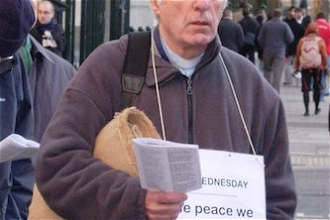Cautious welcome to nuclear weapons treaty
News that the nuclear powers have signed up to a new non-proliferation treaty this week has received a cautious welcome from Christian peace campaigners. Rev David Platt from Christian CND said: "We are cautious bearing in mind that most of what has been agreed is already enshrined in several earlier treaties going back 30 years. If these had been honoured, we would not have seen India and Pakistan develop their nuclear arsenals." He continued: "We are also worried about the development of the Son of Star Wars project. This will build a protective shield over North America with spy bases here - turning these islands into targets for anyone wishing to attack the US. I'm worried that Tony Blair could sign up to this. I'm also concerned that neither the US nor NATO will sign a no first-use treaty." Pat Gaffney, general secretary of the International Catholic Peace Movement said: "We welcome the fact that there was such a consensus of opinion between all five powers. But we are concerned that they have not set a time table for disarmament. We also don't see where Trident and the whole status of NATO's missile defence system fits into all this. It will be interesting to see what NATO decided when they meet next week." Dr David Ryall, secretary of the Bishops' Conference Committee for International Affairs said he was unable to give specific comment on the new treaty as the document was very detailed and would require careful study. However, he said the Bishops took the matter very seriously. "Recently there was a high-level briefing by the committee for justice and peace on the history of nuclear disarmament and we are engaged in an on-going process to take the matter forward." In November 1998, the Bishops issued the following statement on the elimination of nuclear weapons: 'The Catholic Church has long proclaimed the need to ban nuclear weapons, a need recognised in the government's election manifesto, which made their elimination a goal. At our Conference in November 1997 we emphasised the special contribution which the United Kingdom, as a declared nuclear weapon state, could make towards this end. Accordingly we asked the government to declare what steps it was currently taking towards this goal and what further steps could be taken in the years leading up to the millennium. 'We have therefore noted with special interest in the light of Cardinal Basil Hume's meeting with the Foreign and Commonwealth Secretary, 2 June 1998. the decision relating to the British nuclear forces announced in the recent Strategic Defence Review. The reductions in the warhead stockpile, the reduced load to be carried by submarines on patrol, the decision that missiles will not be targeted and will normally be at several days' notice to fire, and the greater transparency about our nuclear programmes and fissile materials, are all welcome. We have also noted the government's readiness to enter into negotiations for a multilateral treaty banning the future production of fissile material for nuclear weapons. We hope that this and other nuclear arms control measures will be pursued urgently. Decisions on our own forces are only part of the picture and they need to be complemented by a clear strategy for harnessing international effort towards the goal of eventually eliminating nuclear weapons entirely.


















